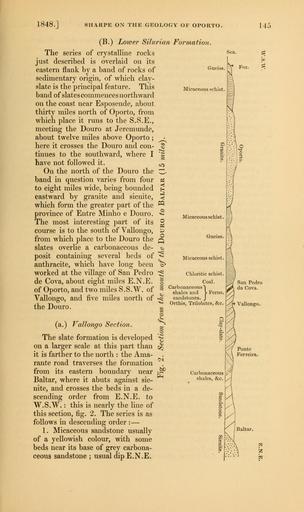MAKE A MEME
View Large Image

| View Original: | The_Quarterly_journal_of_the_Geological_Society_of_London_(12645119373).jpg (1188x2004) | |||
| Download: | Original | Medium | Small | Thumb |
| Courtesy of: | commons.wikimedia.org | More Like This | ||
| Keywords: The Quarterly journal of the Geological Society of London (12645119373).jpg 1848 <br> SHARPE ON THE GEOLOGY OF OPORTO <br> 1-45 <br> Gneiss <br> Micaceous schist <br> B Lower Silurian Formation <br> The series of crystalline rocks <br> just described is overlaid on its <br> eastern flank by a band of rocks of <br> sedimentary origin of which clay- <br> slate is the principal feature This <br> band of slates commences northward <br> on the coast near Esposende about <br> thirty miles north of Oporto from <br> which place it runs to the S S E <br> meeting the Douro at Jeremunde <br> about twelve miles above Oporto ; <br> here it crosses the Douro and con- <br> tinues to the southward where I <br> have not followed it <br> On the north of the Douro the <br> band in question varies from four <br> to eight miles wide being bounded <br> eastward by granite and sienite <br> which form the greater part of the <br> province of Entre Minho e Douro <br> The most interesting part of its <br> course is to the south of Vallongo <br> from which place to the Douro the <br> slates overlie a carbonaceous de- <br> posit containing several beds of <br> anthracite which have long been <br> worked at the village of San Pedro <br> de Cova about eight miles E N E <br> of Oporto and two miles S S W of <br> Vallongo and five miles north of <br> the Douro <br> Sea <br> o <br> <br> ¢J <br> <br> o <br> o <br> P <br> o <br> Foz <br> a Vallongo Section <br> The slate formation is developed <br> on a larger scale at this part than <br> it is farther to the north the Ama- <br> rante road traverses the formation <br> from its eastern boundary near <br> Baltar where it abuts against sie- <br> nite and crosses the beds in a de- <br> scending order from E N E to <br> W S W this is nearly the line of <br> this section fig 2 The series is as <br> follows in descending order ” <br> 1 Micaceous sandstone usually <br> of a yellowish colour with some <br> beds near its base of grey carbona- <br> ceous sandstone ; usual dip E N E <br> o <br> ¢Si <br> o <br> OX <br> Micaceous schist <br> Gneiss <br> Micaceous schist <br> Chloritic schist <br> Coal <br> Carbonaceous <br> shales and Ferns <br> sandstones J <br> Orthis Trilobites c <br> San Pedro <br> da Cova <br> y Vallongo <br> Ponte <br> Ferreira <br> Carbonaceous <br> shales c \A <br> A <br> Baltar 35268787 109512 51125 Page 145 Text v 5 http //www biodiversitylibrary org/page/35268787 1849 Geological Society of London NameFound Orthis NameConfirmed Orthis EOLID 4333134 NameBankID 4270859 Biodiversity Heritage Library The Quarterly journal of the Geological Society of London v 5 1849 Geology Periodicals Smithsonian Libraries bhl page 35268787 dc identifier http //biodiversitylibrary org/page/35268787 smithsonian libraries Information field Flickr posted date ISOdate 2014-02-20 Check categories 2015 August 26 CC-BY-2 0 BioDivLibrary https //flickr com/photos/61021753 N02/12645119373 2015-08-27 10 58 07 cc-by-2 0 PD-old-70-1923 The Quarterly journal of the Geological Society of London 1849 Photos uploaded from Flickr by Fæ using a script | ||||